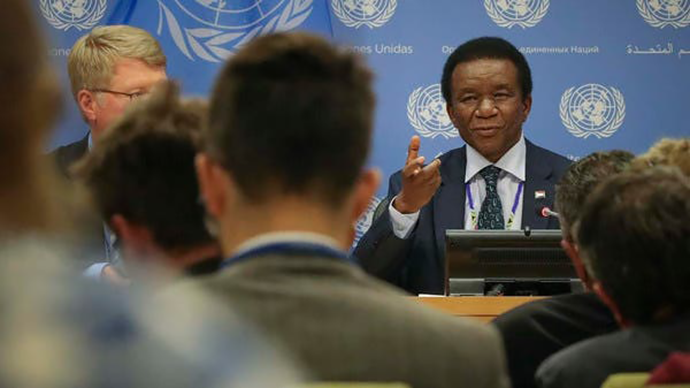NEW YORK: The UN Security Council (UNSC) has urged warring parties in Libya to build on the UN-led Libyan Political Dialogue Forum (LPDF) that took place in Tunisia last month.
The UNSC’s current president, South Africa’s Ambassador to the UN Jerry Matjila, emphasized that a “successful political process was essential for the stability and future prosperity of Libya.”
The LPDF built upon a nationwide cease-fire deal concluded in October between Libya’s warring rivals during UN-facilitated talks in Geneva.
Matjila’s statement came after the UNSC held a meeting behind closed doors, during which Stephanie Williams, acting special representative for Libya, briefed member states on the status of negotiations for a new constitution.
Speaking later at an online LPDF meeting, Williams said Libya’s rivals failed to agree on a procedure to choose a transitional government that would shepherd the country to elections in December 2021.
She said she would form an advisory committee to help mend the differences among participants.
The 75-member forum is part of UN efforts to end the chaos that upended the oil-rich North African nation after the 2011 overthrow and killing of dictator Muammar Gaddafi.
Despite six online meetings since their face-to-face in Tunisia, during which the participants agreed to hold presidential and parliamentary elections on Dec. 24, 2021, they sparred over the selection mechanism for the executive authority that would lead the country to the elections.
“The train has left the station on this process,” Williams said. “There’s no going back … Let’s not litigate the past. There’s been a lot of litigation of the past, but we need to look forward.”
Meanwhile, US Secretary of State Mike Pompeo slammed his Russian counterpart Sergei Lavrov after the latter accused Washington of “playing political games in the Mediterranean” and stalling the appointment of a new UN envoy for Libya.
“It’s unfortunate and unhelpful that Mr. Lavrov again gets the facts wrong and attempts to rewrite history,” said Pompeo in a statement.
“In Libya, (the US) wants an empowered UN Mission that can accomplish (security, stability and prosperity). To this end, the United States worked with our partners on the UN Security Council to strengthen the UN system and create a UN Special Envoy position and a complementary UN Support Mission in Libya (UNSMIL) Coordinator in UNSMIL’s 2020 mandate renewal. Russia and China were the only UNSC members to abstain on the Security Council resolution renewing UNSMIL’s mandate.”
Pompeo accused Russia of sowing chaos in the region. “If anyone is playing political games and trying to stall progress in regional conflicts, it is Russia, which only acts to advance its own interests to the detriment of the entire region,” he said.
Asked about the implications of such accusations on the choice of the next envoy for Libya, Stephane Dujarric, spokesman for the UN secretary-general, told journalists: “We could organize a game of bingo about the naming of special representatives, but at this point I have no names to pull out of a bowl.”
Dujarric added: “The process is ongoing. As you know, it’s not solely in the hands of the secretary‑general. As soon as we have something to announce, I’ll gladly announce it so I can stop answering questions about when the announcement will come.”

UN Security Council demands ‘unconditional’ access to decaying Yemen tankerUN Security Council president dismisses US sanctions move on Iran

